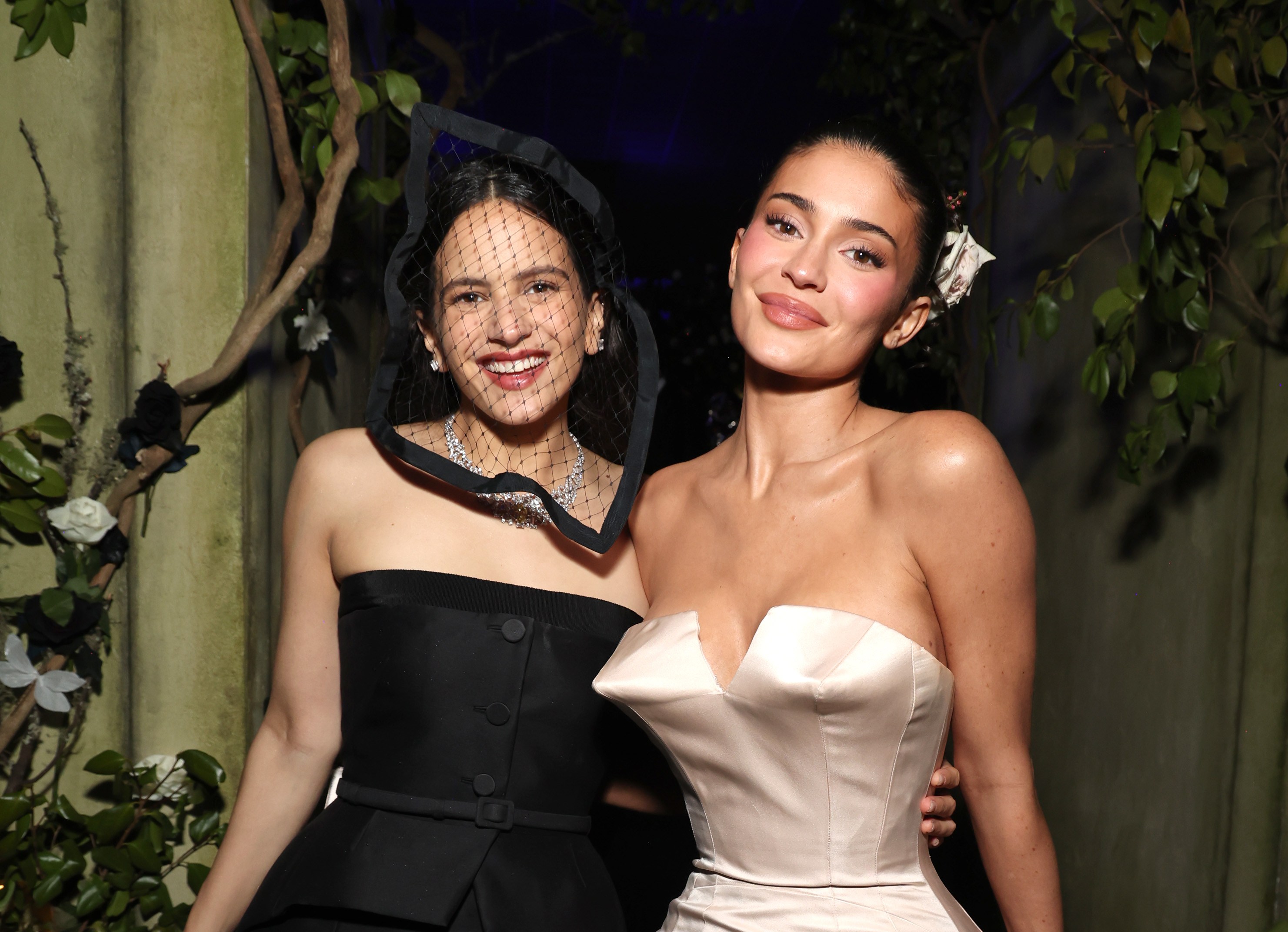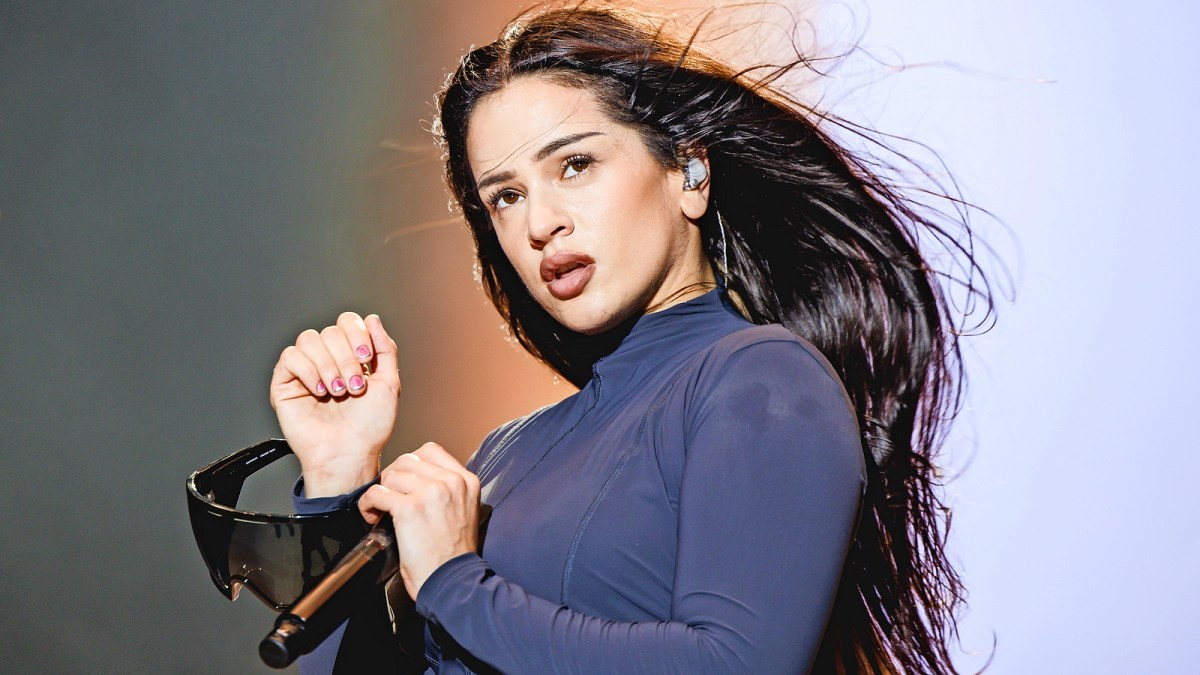The most striking album of the year did not come from Lily Allen airing her dirty laundry in public on West End Girl, or Taylor Swift giving a perky pop rundown of her dazzling life so far on The Life of a Showgirl. Lux by Rosalía is a vastly ambitious treatise on God, faith, love and all things in between.
It unfolds over 60 minutes, in 14 languages, features backing from the London Symphony Orchestra, cameos from Björk, Guy-Manuel de Homem-Christo of Daft Punk and Pharrell Williams, and takes inspiration from, among many other things, the hagiographies of female saints from across the globe. It goes against the current tendency for bitesized hooks that can be dispersed over social media, or catchy opening bars that grab the listener and guarantee high streaming numbers. “The more we are in the era of dopamine, the more I want the opposite,” Rosalía says. More significantly, the 33-year-old has bucked the trend for pop stars to feel they must sing from a relatable, personal perspective to connect with their fans. Lux is that outdated phenomenon: a creative world of its own.
• The ecstasy of ‘Saint Rosalía’: Spain goes wild for pop sensation
What’s really fascinating is how old-fashioned this album is; something the streaming age was meant to have killed off. Like Pink Floyd’s Dark Side of the Moon or Joni Mitchell’s Blue, Lux is a body of work that demands full immersion, rather than a soundtrack to dancing or doing the dishes. In an age when any vocal recording can be cleaned up digitally, Rosalía can really sing, having trained at the Catalonia College of Music.

Rosalía’s new album is “a creative world of its own”
GIANFRANCO TRIPODO/THE NEW YORK TIMES/EYEVINE

The cover art for Lux, an album which Will Hodgkinson deemed “exquisite”
COLUMBIA RECORDS VIA AP
The album has even opened a debate on whether a pop figure like this can be allowed to enter the realms of opera, with the New York Times’s classical critic Joshua Barone giving kudos for Rosalía’s ability to bend the limits of commercial music but concluding that “she uses [classical and opera] to signal extreme scale and feeling without committing to either”. Not since the Beatles released Sgt Pepper have high-minded critics had to defend the classical castle so fiercely as the pop barbarians threaten to smash down the door.
Born in 1992 to a Galician father and a Catalonian mother, who runs a family business specialising in metal window frames, Rosalía Vila Tobella was immersed in modern pop and classical traditions from an early age. As a teenager she combined her studies with work as a wedding singer, and plunged into an underground Barcelona music scene that enjoyed a brief boom in the Noughties. And she took risks. Her 2018 breakout album, El Mal Querer, was an update on flamenco traditions which began as a college project but took over her life so completely that it almost bankrupted her. It also made her a star. Kourtney Kardashian and Dua Lipa proclaimed themselves fans.
• Rosalía: Lux review — surrender to this exquisite work
Since then, Rosalía has walked a tightrope between the publicity-based life of a celebrity and the rather more ascetic approach that a project of Lux’s depth demands. She has modelled for Calvin Klein, but once walked the pilgrimage to Santiago de Compostela. She claims to have left her family in Barcelona to spend the best part of three years in isolation to make Lux (albeit in the less than monkish location of Los Angeles). “There’s no other way,” she said in a recent interview. “It takes a lot of simplifying the day, doing barely nothing but this.” Supporting her is a female-led team that includes her managers, Rebeca León and her mother Pilar Tobella, her sister and creative director Pili (or Daikyri, her artistic name), and the choreographer Charm La’Donna.
For all of Lux’s theological inspirations — God Is a Stalker is a reflection on divine omnipresence, Berghain (featuring Björk) draws on the life of the 12th-century Benedictine abbess Hildegard von Bingen, while on Novia Robot she lays it bare by claiming to be “hot for God” — Rosalía is also a normal woman in her thirties, dealing not just with the mysteries of faith but disappointing boyfriends too.
“Emotional terrorist, the greatest disaster in the world,” go the lyrics to La Perla, widely assumed to refer to her former fiancé, the Puerto Rican reggaeton star Rauw Alejandro. There was also a real Hollywood romance when Rosalía went out with Jeremy Allen White, star of The Bear and Deliver Me From Nowhere, in 2023. “She’s flamenco, she’s wonderful,” White said when asked this year to comment on a relationship that lasted for about a year. And he left it at that.

Jeremy Allen White and Rosalía in New York in 2023
GOFFPHOTOS
This is an album for the ages that sounds absolutely nothing like anything else released this year and straddles the distance between pop and classical, sacred and profane, while dealing with the Catholic faith that she was brought up in.
This isn’t quite the isolated move it may at first seem. Pop stars love nothing more than a set of aesthetics to attach themselves to and Catholicism has been enjoying something of a renaissance over the past few years. In April a survey called The Quiet Revival reported that church attendance in Britain has increased by 50 per cent over the past six years, with people aged between 18 and 24 the largest demographic in attendance besides over-65s. Even my distinctly irreligious Gen Z daughter has been talking about a TikTok trend for Catholicism: “A few of my friends were going to church all of a sudden, posting religious imagery up on social media. But it was also connected to Lana Del Rey’s American gothic aesthetic, so how long-standing their faith will prove, I’m not sure.”
• The best new songs of 2025 to listen to this week
All of this has fed into the success of Lux, an immersive masterpiece that has proved a balm in our age of constant distraction — rather as the boom in knitting and making collages has proved an escape from the anxieties of online life.
To put it all into perspective, Rosalía is a big artist but still not a huge one. Berghain only got to No 18 on the Spotify global songs chart, and she’s nowhere to be found on the Billboard Hot 100. But Lux could make the UK No 1 this week, where it must battle it out with Taylor Swift’s The Life of a Showgirl. The hook-filled latest by the world’s biggest pop star, versus a multi-language, four-part symphony with a lead single about Hildegard von Bingen? If nothing else, it proves that modern pop is a fascinating place.
Move over, new Rosalía fans — I was here first
by Blanca Schofield
I can’t count the number of times I’ve cried listening to Rosalía since I was introduced to her in 2018 by my older brother. On the day Lux, her fourth album (the best of the year, hands down), was released last week, it was thrice by midday (the weeping started with Reliquia, my favourite track). Partly, as a Spaniard, it’s down to the particular emotion an expat feels listening to music from their country when they’re away — think of the scene in Brooklyn when an Irishman stands up to sing for his compatriots living in America and how the tears well up in Saoirse Ronan’s eyes.
Partly it is the quality of her voice, trained from an early age in flamenco and easily capable of reaching operatic heights (listen to Mio Cristo Piange Diamanti). But there’s something about the bravery of her work too that makes me emotional, even when only reading our critic Will Hodgkinson’s five-star review of Lux. In an era when “churn” is the norm in culture — constant content creation to keep the algorithm happy — Rosalía took three years to make Lux. She dares her global Gen Z fanbase to embrace music you have to focus on, not have playing in the background on one earbud as you scroll.
• Read more music reviews, interviews and guides on what to listen to next
Spanish-language music has steadily taken off in the past decade: in 2024 it was the fastest-growing genre in the US. Puerto Rico’s Bad Bunny is the next Super Bowl headliner. But the most famous artists in this wave are from Central and South America. Rosalía is the only one from Spain that most international music lovers would be able to name after Enrique and Julio Iglesias (another who gets me blubbing: just listen to El Amor or Me Olvide de Vivir). It’s gratifying to see Brits enjoy music from your country and embrace culture in another language, especially given the atrociously poor state of foreign language learning in this country — last week it was announced the University of Nottingham was suspending all modern languages (and music) courses for future students.

Rosalia performing at the 24th annual Latin Grammy awards in Spain in 2023
JOSE BRETON/INVISION/AP
I have found myself reacting a little gruffly to new Rosalía listeners over the last week, however — as tends to happen with passionate fandom. There’s a protectiveness, like when the whole world suddenly started liking Charli XCX during brat summer. “You don’t know her like I do, I was here first!” you feel like shouting. Also, can you please pronounce her name correctly? It’s not RosAlia, there’s an accent and so an emphasis on the I. But I push away this pettiness. I’m happy to welcome the new Motobabies (named after her third album, Motomami); let’s do some collective crying.
It’s not as if she’s just arrived on the scene, even in the UK. Rosalía’s first hit, Malamente — from her visionary second album, El Mal Querer — appeared in Michaela Coel’s BBC drama I May Destroy You in 2020, and she performed at the O2 arena in 2022. I became a fan when I was at university and would regularly play her songs on my radio show, Chicas, Chats n Choons, that focused on music by women, particularly Pienso en Tu Mira (also from El Mal Querer) and the 2019 single Aute Cuture, a pop parody about the power of trends, driven by palmadas (hand claps). That description alone should explain why she’s so special.

Rosalía and Kylie Jenner at the 2024 Met Gala
KEVIN MAZUR/MG24/GETTY IMAGES FOR THE MET MUSEUM/VOGUE
Expect to hear much more about Rosalía in 2026, as she (hopefully) announces a tour and takes to the screen in Euphoria, the HBO blockbuster series about troubled teens, which is coming back for a third series. It’s not the first time she has acted: she also appeared in Pedro Almodóvar’s 2019 film Pain and Glory. But Euphoria will launch her into even greater fame, as she co-stars with the likes of Sydney Sweeney, Jacob Elordi and Zendaya. She’s already part of that world anyway: she regularly appears on the front row at fashion shows beside Kylie Jenner and parties with Charli XCX. Superstardom awaits. Get ready for a Motobaby boom.

